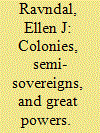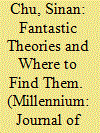|
|
|
Sort Order |
|
|
|
Items / Page
|
|
|
|
|
|
|
| Srl | Item |
| 1 |
ID:
171922


|
|
|
|
|
| Summary/Abstract |
How did the transition from a world of empire to a global international system organised around the sovereign state play out? This article traces the transition over the past two centuries through an examination of membership debates in two prominent intergovernmental organisations (IGOs). IGOs are sites of contestation that play a role in the constitution of the international system. Discussions within IGOs reflect and shape broader international norms, and are one mechanism through which the international system determines questions of membership and attendant rights and obligations. The article reveals that IGO membership policies during this period reflected different compromises between the three competing principles of great power privilege, the ‘standard of civilisation’, and universal sovereign equality. The article contributes to Global IR as it confirms that non-Western agency was crucial in bringing about this transition. States in Africa, Asia, and Latin America championed the adoption of the sovereignty criterion. In this, paradoxically, one of the core constitutional norms of the ‘European’ international system – the principle of sovereign equality – was realised at the hands of non-European actors.
|
|
|
|
|
|
|
|
|
|
|
|
|
|
|
|
| 2 |
ID:
188991


|
|
|
|
|
| Summary/Abstract |
How can we appreciate non-Western agency in theorising world politics without reintroducing parochialism and exceptionalism, thus reproducing the very problem that motivated global international relations (IR) in the first place? In this article, I explore an alternative approach to engaging with non-Western IR theories, which I refer to as the embedded observer approach. First, taking the scholarship on Chinese IR as an example, I argue that the present predicament of global IR is in part attributable to the way scholars engage with non-Western political thought. Drawing from discussions in critical IR and Comparative Political Theory, I propose a methodological adjustment for the study of non-Western theories. Specifically, I argue that by shifting focus from isolated scholars and texts to critical dialogues among autochthonous intellectuals, the researcher has the chance to learn about and appreciate the clashes of ideas, analytical perspectives, and methodological tools that together constitute the living intellectual tradition in a non-Western society. As a demonstration, I analyse the People’s Republic of China (PRC) scholars’ critical reaction to Zhao Tingyang’s Tianxia System through the lens of three key topics in the debate over the thesis. The discussion highlights the need to rethink interlocutors in global IR and the utility of an embedded observer approach for engaging with knowledge traditions beyond the West, both in IR and beyond.
|
|
|
|
|
|
|
|
|
|
|
|
|
|
|
|
| 3 |
ID:
151572


|
|
|
|
|
| Summary/Abstract |
Drawing on a notable example of a non-Western normative initiative, Brazil’s ‘Responsibility while Protecting’ (RwP), this article contributes to broadening the scope of the norm dynamics literature beyond its common Western-centric focus. Post-2011 Libya intervention, Brazil proposed RwP to clarify what ‘using force’ means under the Responsibility to Protect (R2P) banner, but then withdrew from visible norm sponsorship, only to return to this as part of a collective exercise to institutionalise R2P at the United Nations. First, the article highlights the significant role of non-Western agents whose contributions usually go overlooked, yet carry the highest potential to address the legitimacy deficit of norms like R2P. Second, the article proposes adding a new conceptual tool when investigating the role of agency in norm dynamics, one that incorporates a wider range of norm ‘shaping’ processes and highlights enabling, contingent circumstances. The latter, is argued, best captures the anomalies in contemporary norm contestation. This is illustrated through an empirical analysis of the conditions under which Brazil was able to advance RwP, despite the subsequent emergence of unfavourable circumstances. This article emphasises how significant an alignment of enabling circumstances is to non-Western agents in terms of shaping norm contestation and normative exercise completion.
|
|
|
|
|
|
|
|
|
|
|
|
|
|
|
|
|
|
|
|
|